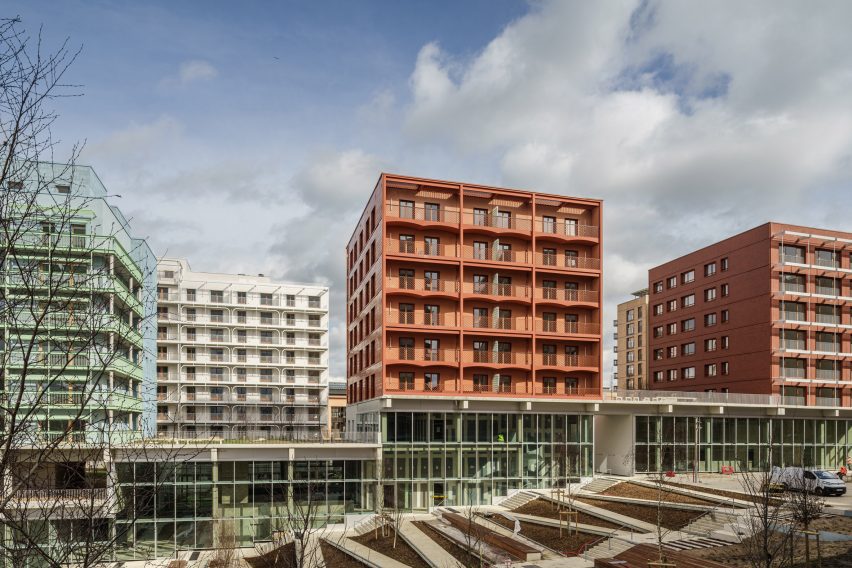Although the Paris 2024 Olympic Games have taken an exemplary approach to construction, reusing venues is not enough to make the games truly sustainable, argues Carbon Market Watch’s Benja Faecks as part of our Olympic Impact series.
By relying mainly on existing infrastructure and setting ambitious carbon budgets for any new builds, this year’s Olympics have dramatically reduced construction-related emissions compared to previous editions.
But this doesn’t address the fundamental issue with the games according to Faecks, who is an expert on global carbon markets at non-profit watchdog Carbon Market Watch.
“The things they did well, they really did well – but it’s not enough to really make the Olympic Games as sustainable as they could be,” she told Dezeen. “The elephant in the room is still the size of the event and the spectators.”
“It’s the hardest thing to solve,” she added. “And that probably will never be tackled if you keep having the games in one single location.”
Event surpasses national green building codes
Paris 2024 is working to cut its emissions by 50 per cent compared to London 2012 and Rio 2016, as it strives to become the first Olympic Games in line with the Paris Agreement goal of halving global emissions by 2030.
And the organisers have made construction the primary tool in their carbon-slashing arsenal.
In previous editions, new buildings generally accounted for a major chunk of emissions, generating 60 per cent of London’s 3.3 million-tonne carbon footprint, equivalent to 1.98 million tonnes CO2e.
“If you look at the five different emission sources, construction normally does make up for a lot of the emissions,” Faecks said. “And that’s also mostly what’s been scrutinised in the media.”
For Paris, the organisers are working to reduce this to 450,000 tonnes CO2e – 30 per cent of the event’s 1.58 million-tonne carbon budget – by relying on 95 per cent temporary or existing infrastructure.
And in the new athletes’ village, which will be converted into housing in the wake of the games, the aim is to reduce emissions per square metre by 30 per cent through using recycled and biobased materials – a more ambitious target than required under France’s green building regulations.
“That’s a way in which Paris does lead by example,” Faecks said.
“Focus should have been on spectator travel”
However, a report penned by Faecks for Carbon Market Watch found that the event’s climate strategy disproportionately prioritises construction as a flagship category alongside food, which accounts for less than one per cent of the footprint but 20 per cent of the strategy.
“From my perspective, the real focus should have been on spectator travel,” she said. “But they say at several points: this is not fully our responsibility and we can’t impact the choices people make and how they come here.”
Despite the fact that spectator transport to and from Paris accounts for the largest chunk of the event’s carbon budget, Faecks said organisers have remained “relatively silent” on the issue.
This disregard for the massive carbon impact of air travel is further underlined by the fact that AirFrance is one of the key sponsors of this year’s Olympics, she claimed.
In fact, all of the event’s official partners, including Coca-Cola and steel manufacturer ArcelorMittal, are running their operations in a way that is “incompatible with the objectives of the Paris Agreement”, Faecks argued in her report.
“All the sponsors of Paris right now are on a pathway to climate catastrophe,” she said. “The message the sponsors are sending to the world is: look at us, we’re good but we’re completely fuelling everything bad.”
“Not enough trust in the system”
Whether Paris 2024 will ultimately be in line with the Paris Agreement remains to be seen. “It is a waiting game because there are so many things that could go wrong,” Faecks said.
Already, a number of issues have arisen that could jeopardise the 1.58 million-tonne carbon budget, as several new public transport routes are delayed and hundreds of athletes have insisted on having air conditioning units in their rooms, originally designed to be cooled solely via a low-carbon geothermal system.
This could spell a “catastrophe” for the event’s carbon targets, Faecks believes.
“So much money went into this new innovation,” she explained. “But there’s not enough trust in the system for it to have the effect that it should have on the environment.”

There are also questions about whether the construction standard set by the Paris Olympics can be met by other host cities, which might have less existing infrastructure.
The organising committee for Los Angeles 2028 has already committed to building no new facilities for the event. But Brisbane, which is set to host the summer games in 2032, is planning to construct six new permanent venues alongside four Athletes’ Villages.
“We don’t know if the games in general will be on a [carbon] reduction pathway – so if the next games have to be lower and the next games have to be lower than that,” Faecks said.
“We actually don’t have any declaration on what the plan is,” she added. “Imagine if the next games are in a country where there’s not so much existing infrastructure, would you also request from them to go lower than Paris?”
“It’s a fairness versus sustainability angle and the easier solution, in that sense, is to go radically rethink the games.”
“The stress on one single location is too big”
One possible solution would be to create a decentralised event, held simultaneously across multiple countries and cities to spread the burden on local infrastructure and encourage spectators to take shorter overland travel routes, Faecks argues.
This, she says, could help to slash the impact of the Olympics while also making it accessible to more people around the world.
“And that then takes away pressure from construction because you don’t have to build massive stadiums,” Faecks said.
“The stress on one single location is too big,” she added. “Incremental progress is good but it will never lead to truly sustainable games.”

Olympic Impact
This article is part of Dezeen’s Olympic Impact series examining the sustainability measures taken by the Paris 2024 Olympic and Paralympic Games and exploring whether major sporting events compatible with the climate challenge are possible.

